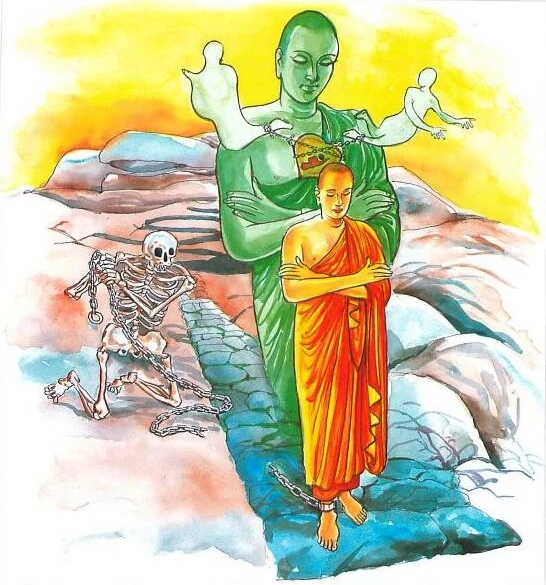Verse 37: The mind wanders far and moves about alone: it is non-material; it lies in the cave (chamber) of the heart. Those who control their mind will be free from the bonds of Mara.
- ekacaram: walking alone, moves about alone, it means conceiving one thought at a time, i.e., one thought arises only when another ceases.
-
guhasayam: lit., lying, or sleeping in a cave; mind lies and arises continually in the cave (chamber) of the heart (hadayavatthu), the seat of consciousness.
The Story of Thera Samgharakkhita
While residing at the Jetavana monastery, the Buddha uttered Verse (37) of this book, with reference to the nephew of Thera Samgharakkhita.
Once, there lived in Savatthi, a senior bhikkhu by the name of Samgharakkhita. When his sister gave birth to a son, she named the child after the thera and he came to be known as Samgharakkhita Bhagineyya. The nephew Samgharakkhita, in due course, was admitted into the Order. While the young bhikkhu was staying in a village monastery he was offered two sets of robes, and he intended to offer one to his uncle, the thera.
At the end of the vassa he went to his uncle to pay respect to him and offered the robe to the thera. But, the uncle declined to accept the robe, saying that he had enough. Although he repeated his request, the thera would not accept. The young bhikkhu felt disheartened and thought that since his uncle was so unwilling to share the requisites with him, it would be better for him to leave the Order and live the life of a layman.
From that point, his mind wandered and a train of thoughts followed. He thought that after leaving the Order he would sell the robe and buy a she-goat; that she-goat would breed quickly and soon he would make enough money to enable him to marry; his wife would give birth to a son. He would take his wife and child in a small cart to visit his uncle at the monastery. On the way, he would say that he would carry the child; she would tell him to drive the cart and not to bother about the child. He would insist and grab the child from her; between them the child would drop on the cart-track and the wheel would pass over the child. He would get so furious with his wife that he would strike her with the goading-stick.
At that time he was fanning the thera with a palmyra fan and he absentmindedly struck the head of the thera with the fan. The thera, knowing the thoughts of the young bhikkhu, said, “You were unable to beat your wife; why have you beaten an old bhikkhu?” Young Samgharakkhita was very much surprised and embarrassed at the words of the old bhikkhu; he also became extremely frightened. So he fled. Young bhikkhus and novices of the monastery chased him and finally took him to the presence of the Buddha.
When told about the whole episode, the Buddha said that the mind has the ability to think of an object even though it might be far away, and that one should strive hard for liberation from the bondage of passion, ill will and ignorance.
Then the Buddha spoke in verse as follows:
Verse 37: The mind wanders far and moves about alone: it is non-material; it lies in the cave (chamber) of the heart. Those who control their mind will be free from the bonds of Mara.
At the end of the discourse the young bhikkhu attained Sotapatti Fruition.
Dhammapada Verse 37
Samgharakkhitatthera Vatthu
Durangamam ekacaram1
asariram guhasayam2
ye cittam samyamissanti
mokkhanti marabandhana.
Source: Tipitak








Add a comment